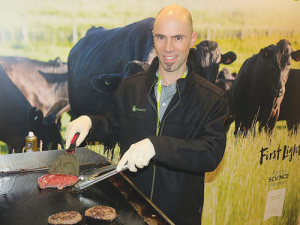NZ scientists make breakthrough in Facial Eczema research
A significant breakthrough in understanding facial eczema (FE) in livestock brings New Zealand closer to reducing the disease’s devastating impact on farmers, animals, and rural communities.
 AgResearch senior scientist Matthew Barnett serving up Waygu treats to the punters at this year’s National Fieldays.
AgResearch senior scientist Matthew Barnett serving up Waygu treats to the punters at this year’s National Fieldays.
A three-year research project to try to discover whether grass-fed Wagyu beef has significant health benefits is in its final stages.
The project, initiated by the Government, involves Firstlight Farms, which produces the Wagyu beef, AgResearch and Auckland University.
The object of the trial, says a Firstlight Farms founder Jason Ross, is to validate their assumptions that grass-fed Wagyu beef has more of the good fats than grain-fed beef, with consequent health benefits for consumers.
Ross says a healthy diet would contain a balance of Omega 3 and Omega 6. Grass-fed Wagyu beef has a higher proportion of Omega 3 than grain-reared meat, he says.
“The modern diet has a higher proportion of Omega 6 to Omega 3 because we have more grain or corn in our base diet than we did historically,” Ross told Rural News.
“You get Omega 3s from fish and grass-fed meat amongst other things. In grain-fed beef, the ratio of Omega 6 was significantly higher than Omega 3, whereas in the grass-fed Wagyu beef it was almost 1 for 1.”
Ross says having found out the composition of Omega 3 in Wagyu, the trial has now entered the final stage of seeing whether the grass-fed Wagyu can benefit human health.
“We are targeting the ‘at risk’ group – men aged 50 and older -- in our trial group. Three times a week we are giving them grass-fed Wagyu beef in various forms. We are trying to mimic their diet; so we are not giving them three burgers a week, but rather a steak and burger and other portions of grass-fed beef.
“At the same time, we are giving a similar number of people in the target group grain-fed beef and then taking blood samples to see if there is a difference to their health and, in particular, their cholesterol levels and heart condition.”
Ross says this is taking place at the Riddet Institute under strict research conditions.
A discovery that Wagyu beef is good for health would be good news.
“We wouldn’t have a sticker or claim put on the meat,” he says. “We just want to be reassured that we are doing the right thing.”
About 90% of Wagyu beef produced in NZ is exported, mainly to the US and Europe. It is also sold in about 100 NZ supermarkets.
Wagyu beef was on show at Fieldays last month with AgResearch running a public cooking demonstration and sampling.
Senior scientist Matthew Barnett says their research has shown the health benefits of grass-fed Wagyu beef, in particular the presence of beneficial fats not found in other meats.
This is not lost on consumers who “are now much more health aware,” Barnett says.
“And we know consumers in export markets are interested in health and in knowing that the food they eat is good for their health.
Firstlight agyu recently won a gold medal at Steak of Origin (retail brand) and another gold in London at the World Steak Challenge.
Former Fonterra executive Alex Turnbull has been appointed CEO to lead all five Yili Oceania Business Division companies in New Zealand.
Fonterra executive René Dedoncker is leaving the co-operative later this year to lead Australian agribusiness Elders.
Alliance Group and the Southland Stags rugby team have joined forces in a partnership that will see the the meat co-operative's farmgate brand feature on players' team kits and replica jerseys.
Fonterra's plan to expand its organic programme to the South Island is being well received by farmers, the co-op says.
Voting has started for the renewal of DairyNZ's milksolids levy.
The most successful catchment groups in NZ are those that have 'a source to sea' approach.

OPINION: Here w go: the election date is set for November 7 and the politicians are out of the gate…
OPINION: ECan data was released a few days ago showing Canterbury farmers have made “giant strides on environmental performance”.